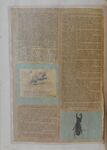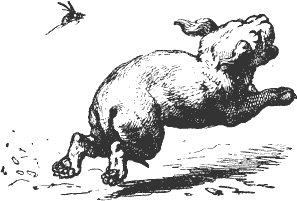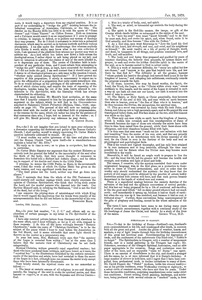Difference between revisions of "HPB-SB-8-136"
m |
m |
||
| Line 8: | Line 8: | ||
{{Style P-HPB SB. Title continued |The Religious Aspects of Spiritualism|8-135}} | {{Style P-HPB SB. Title continued |The Religious Aspects of Spiritualism|8-135}} | ||
| − | ... | + | {{Style P-No indent|more, it would imply a departure from my original position. It is no part of my undertaking to “bridge the gulf” existing between the intellectual conceptions of Arminians, Calvinists, or the like. The dweller on the Mendip Hills has little to do with the sports of “Giant Gomer” and “Giant Vincent” on Clifton Downs. Both an Arminian and a Calvinist would resent it as an impertinence if I were to attempt to criticise, to impugn, to defend, or to palliate any system of theology they may possess. Nor do I think it necessary to enter into a polemical discussion, which may be carried on in various methods and from various standpoints. I am also under the disadvantage that whereas anybody (who thinks it worth while) may know what is my own ''criterium ''of truth, I am ignorant of the platform from whence my querist may wish to address me. As a bird which has before now flown a little across the theological arena, I rather object to salt being placed on my tail, and have no intention to advocate the claims of any of the sects alluded to, or to depreciate any of them. The centre of Christian faith is independent of any particular form, and I must refrain from attempting to “bridge the gulf” which some, at least, have excavated for themselves. As I did not make the gulf, I am well content that it should exist; and I demur to all theological polemic as a side issue to the question I raised, “whether unity existed among Spiritualists?” If I have proved the negative of this proposition, it surely is unnecessary to expect me to prove the affirmative of a proposition that unity exists somewhere else. To do so would infringe on the privileges of the advocates of the sects, each of which claims unity, and require the train of reasoning of the theologian, besides being far out of the wide limits allowed to contributors to ''The Spiritualist, ''with the liberality which has always characterised its editorship.}} |
| + | |||
| + | I therefore must decline Mr. Mould’s kind invitation, at the same time that I heartily commend to him for his perusal a rather elaborate argument on the subject, which he will find in the ''Commonitorium ''attached to Nakateni’s ''Caleste Palmetum ''(Malines, 12mo., 1848), especially on page 765. The perusal of this will save me making your readers tired with the recital of my individual faith or prepossessions, or the reasons for the same, which are rather too long for the patience of that numerous class who, I hope, feel no interest in the matter; or, I'' ''will give Mr. Mould privately any reference he may desire. | ||
| + | |||
| + | {{Style P-Signature in capitals| C. Carter Blake.}} | ||
{{HPB-SB-item | {{HPB-SB-item | ||
| Line 40: | Line 44: | ||
| item = 2 | | item = 2 | ||
| type = article | | type = article | ||
| − | | status = | + | | status = proofread |
| continues = | | continues = | ||
| author = Wild, George, M.D. | | author = Wild, George, M.D. | ||
| Line 46: | Line 50: | ||
| subtitle = | | subtitle = | ||
| untitled = yes | | untitled = yes | ||
| − | | source title = Spiritualist | + | | source title = London Spiritualist |
| − | | source details = | + | | source details = No. 336, January 31, 1879, p. 58 |
| publication date = 1879-01-31 | | publication date = 1879-01-31 | ||
| original date = | | original date = | ||
| Line 54: | Line 58: | ||
}} | }} | ||
| − | ... | + | {{Style S-Small capitals| Sir}},—In your last number, “A. J. C.” and others ask an explanation of certain passages in my letter in ''The Spiritualist ''of the 10th inst. |
| + | |||
| + | I have also received private letters from Germany and elsewhere to the same effect, and I most willingly, so far as I am able, respond to these requests. I do this all the more willingly because “Esoteric Christianity,” under the name of “Christian Occultism,” is to be the subject of the paper which I hope to read before the Association on the 3rd March, and it seems advisable that some light should be thrown on the matter as a preparatory step. | ||
| + | |||
| + | In your last issue, Mrs. Matheson truly says that “the mystery of the Logos is revealed from within;” but at the same time I believe that the esoteric view of Christianity can be set forth categorically. | ||
| + | |||
| + | Mystical Christian writers generally repel superficial readers; but those who have pondered those writings, and have found, as it were, the “mystical key” in the illustrations furnished by the ecstatic entrancements of the psychics and saints, have had revealed to them the secret of the Logos as a fact, although none can possess the secret truly except those who have been internally illuminated. | ||
| + | |||
| + | Very briefly stated, the mystical views are to me somewhat as follows:— | ||
| + | |||
| + | 1. The inner or esoteric essence of all religions is one and identical, namely, the longing of the soul to evoke its spiritual centre, and thus become ''en rapport, ''or at one, with the Supreme and Divine Centre— God. | ||
| + | |||
| + | 2. Man is a trinity of body, soul, and spirit. | ||
| + | |||
| + | 3. The soul, or mind, or terrestrial ego controls the body during the earth life. | ||
| + | |||
| + | 4. The spirit is the God-like essence, the image, or gift of the Creator which dwells hidden or submerged in the centre of the soul. | ||
| + | |||
| + | 5. To “save the soul” man must “know himself,” and to do that he must seek, find, and evoke his spirit, and, when found, unite it to God actually, and thus become “One with the Father.” | ||
| + | |||
| + | 6. As a first step, man must determine to ''“Love ''the Lord his God with all his ''heart, ''and ''strength, ''and ''soul, ''and ''mind, ''and his neighbour as himself.” He must resolve on a life of purity of thought, word, and deed, be temperate in all things, and practice continual love, and truth, and self-sacrifice. | ||
| + | |||
| + | 7. The body and soul being thus prepared and purified by years of constant discipline, the believer then proceeds, by intense desire and player, to seek and evoke the hidden God in actual unity. | ||
| + | |||
| + | 8. This is a work of immense difficulty, for “many are called but few are chosen,” and “narrow is the gate that leadeth unto life, and few there be that find it.” The difficulty is all the greater, because “whoso putteth his hand to the plough and turneth back is not fit for the kingdom of heaven,” and relapsing into selfishness, continually retards the progress towards the light. | ||
| + | |||
| + | 9. To those, however, who may be found worthy, the Spirit, the Lord, the Word, the Logos, or the “Christ within every man,” comes suddenly to His temple, and the secret of the Logos is revealed in such a way as eye hath not seen nor ear heard, nor hath it entered into the heart of man to conceive. | ||
| + | |||
| + | 10. The Spirit, or Holy Spirit, or Christ generically, thus becomes the Saviour of the soul in this life, and man while on earth becomes thus also in heaven, even as “the Son of Man who ''is ''in heaven,” and he thus becomes the Divine, the miraculous, the spiritual man. | ||
| + | |||
| + | 11. This as a ''secret ''was revealed by Jesus when He took Peter, and James, and John up into a high mountain apart, and as He prayed He was transfigured before them, and His face shone as the sun, and His raiment was white as the light. | ||
| + | |||
| + | 12. Thus only can man while on earth have the kingdom of heaven, which is within him revealed, and this transfiguration of Jesus of Nazareth becomes the type of those acts whereby the saints have from time to time been raised from the ground, while their faces shone with effulgence, and their chambers became filled with light. | ||
| + | |||
| + | It is thus seen that man must “work out his ''own ''salvation with fear and trembling” from the centre of his own soul, and that any priestly intervention must be an interference with the divine anatomy of the soul, for the Christ in man is the Saviour of the body and soul as physiological and psychological facts. | ||
| + | |||
| + | This is the truest and highest theosophy, and has only been attained to in rare instances and at long intervals, although the time may possibly be not far distant when the Divine man may become more manifested to the world. | ||
| + | |||
| + | Meanwhile, it will be found an ample work to prepare to live the I life; and the truer the life led the greater will become the health and strength, and wisdom and light of mind and body. | ||
| + | |||
| + | The reason, I conceive, why the mystics concealed their views under enigmatical language was, in the first place, as a protection to themselves in times of Church persecutions, and also in order that the worthy only should understand the mystery; for they knew that the powers of evil magic could be obtained by the practice of severe bodily austerities united with intense will force, and that such powers became demoniacal in the hands of wicked men and women. | ||
| + | |||
| + | There is a superficial analogy between the esoteric doctrine of the salvation of the soul and the epidemic conversions of revival periods; but this last not being prepared for by a life of continual self-sacrifice, is like the good seed which “fell on stony ground where it had not much earth: and immediately it sprang up, because it had no depth of earth: but when the sun was up it was scorched, and because it had no root it withered away.” Further, these conversions being unaccompanied by the gifts of prophecy and healing, cannot be the truest salvation of the soul. | ||
| + | |||
| + | The views I have expressed have come to me during many years study of ecstatic entrancement, together with a continual study of the life-teachings of Jesus the Christ, and latterly by a study of the lives of the saints. | ||
| + | |||
| + | {{Style P-Signature in capitals| George Wyld, M.D.}} | ||
<center>'''Spiritualism in Glasgow'''</center> | <center>'''Spiritualism in Glasgow'''</center> | ||
| Line 75: | Line 125: | ||
{{HPB-SB-footer-footnotes}} | {{HPB-SB-footer-footnotes}} | ||
| + | |||
| + | {{HPB-SB-footer-sources}} | ||
| + | <gallery widths=300px heights=300px> | ||
| + | london_spiritualist_n.336_1879-01-31.pdf|page=12|London Spiritualist, No. 336, January 31, 1879, p. 58 | ||
| + | </gallery> | ||
Latest revision as of 10:42, 11 July 2024
< The Religious Aspects of Spiritualism (continued from page 8-135) >
more, it would imply a departure from my original position. It is no part of my undertaking to “bridge the gulf” existing between the intellectual conceptions of Arminians, Calvinists, or the like. The dweller on the Mendip Hills has little to do with the sports of “Giant Gomer” and “Giant Vincent” on Clifton Downs. Both an Arminian and a Calvinist would resent it as an impertinence if I were to attempt to criticise, to impugn, to defend, or to palliate any system of theology they may possess. Nor do I think it necessary to enter into a polemical discussion, which may be carried on in various methods and from various standpoints. I am also under the disadvantage that whereas anybody (who thinks it worth while) may know what is my own criterium of truth, I am ignorant of the platform from whence my querist may wish to address me. As a bird which has before now flown a little across the theological arena, I rather object to salt being placed on my tail, and have no intention to advocate the claims of any of the sects alluded to, or to depreciate any of them. The centre of Christian faith is independent of any particular form, and I must refrain from attempting to “bridge the gulf” which some, at least, have excavated for themselves. As I did not make the gulf, I am well content that it should exist; and I demur to all theological polemic as a side issue to the question I raised, “whether unity existed among Spiritualists?” If I have proved the negative of this proposition, it surely is unnecessary to expect me to prove the affirmative of a proposition that unity exists somewhere else. To do so would infringe on the privileges of the advocates of the sects, each of which claims unity, and require the train of reasoning of the theologian, besides being far out of the wide limits allowed to contributors to The Spiritualist, with the liberality which has always characterised its editorship.
I therefore must decline Mr. Mould’s kind invitation, at the same time that I heartily commend to him for his perusal a rather elaborate argument on the subject, which he will find in the Commonitorium attached to Nakateni’s Caleste Palmetum (Malines, 12mo., 1848), especially on page 765. The perusal of this will save me making your readers tired with the recital of my individual faith or prepossessions, or the reasons for the same, which are rather too long for the patience of that numerous class who, I hope, feel no interest in the matter; or, I will give Mr. Mould privately any reference he may desire.
Oh! |
<Untitled> (Sir,—In your last number...)
Sir,—In your last number, “A. J. C.” and others ask an explanation of certain passages in my letter in The Spiritualist of the 10th inst.
I have also received private letters from Germany and elsewhere to the same effect, and I most willingly, so far as I am able, respond to these requests. I do this all the more willingly because “Esoteric Christianity,” under the name of “Christian Occultism,” is to be the subject of the paper which I hope to read before the Association on the 3rd March, and it seems advisable that some light should be thrown on the matter as a preparatory step.
In your last issue, Mrs. Matheson truly says that “the mystery of the Logos is revealed from within;” but at the same time I believe that the esoteric view of Christianity can be set forth categorically.
Mystical Christian writers generally repel superficial readers; but those who have pondered those writings, and have found, as it were, the “mystical key” in the illustrations furnished by the ecstatic entrancements of the psychics and saints, have had revealed to them the secret of the Logos as a fact, although none can possess the secret truly except those who have been internally illuminated.
Very briefly stated, the mystical views are to me somewhat as follows:—
1. The inner or esoteric essence of all religions is one and identical, namely, the longing of the soul to evoke its spiritual centre, and thus become en rapport, or at one, with the Supreme and Divine Centre— God.
2. Man is a trinity of body, soul, and spirit.
3. The soul, or mind, or terrestrial ego controls the body during the earth life.
4. The spirit is the God-like essence, the image, or gift of the Creator which dwells hidden or submerged in the centre of the soul.
5. To “save the soul” man must “know himself,” and to do that he must seek, find, and evoke his spirit, and, when found, unite it to God actually, and thus become “One with the Father.”
6. As a first step, man must determine to “Love the Lord his God with all his heart, and strength, and soul, and mind, and his neighbour as himself.” He must resolve on a life of purity of thought, word, and deed, be temperate in all things, and practice continual love, and truth, and self-sacrifice.
7. The body and soul being thus prepared and purified by years of constant discipline, the believer then proceeds, by intense desire and player, to seek and evoke the hidden God in actual unity.
8. This is a work of immense difficulty, for “many are called but few are chosen,” and “narrow is the gate that leadeth unto life, and few there be that find it.” The difficulty is all the greater, because “whoso putteth his hand to the plough and turneth back is not fit for the kingdom of heaven,” and relapsing into selfishness, continually retards the progress towards the light.
9. To those, however, who may be found worthy, the Spirit, the Lord, the Word, the Logos, or the “Christ within every man,” comes suddenly to His temple, and the secret of the Logos is revealed in such a way as eye hath not seen nor ear heard, nor hath it entered into the heart of man to conceive.
10. The Spirit, or Holy Spirit, or Christ generically, thus becomes the Saviour of the soul in this life, and man while on earth becomes thus also in heaven, even as “the Son of Man who is in heaven,” and he thus becomes the Divine, the miraculous, the spiritual man.
11. This as a secret was revealed by Jesus when He took Peter, and James, and John up into a high mountain apart, and as He prayed He was transfigured before them, and His face shone as the sun, and His raiment was white as the light.
12. Thus only can man while on earth have the kingdom of heaven, which is within him revealed, and this transfiguration of Jesus of Nazareth becomes the type of those acts whereby the saints have from time to time been raised from the ground, while their faces shone with effulgence, and their chambers became filled with light.
It is thus seen that man must “work out his own salvation with fear and trembling” from the centre of his own soul, and that any priestly intervention must be an interference with the divine anatomy of the soul, for the Christ in man is the Saviour of the body and soul as physiological and psychological facts.
This is the truest and highest theosophy, and has only been attained to in rare instances and at long intervals, although the time may possibly be not far distant when the Divine man may become more manifested to the world.
Meanwhile, it will be found an ample work to prepare to live the I life; and the truer the life led the greater will become the health and strength, and wisdom and light of mind and body.
The reason, I conceive, why the mystics concealed their views under enigmatical language was, in the first place, as a protection to themselves in times of Church persecutions, and also in order that the worthy only should understand the mystery; for they knew that the powers of evil magic could be obtained by the practice of severe bodily austerities united with intense will force, and that such powers became demoniacal in the hands of wicked men and women.
There is a superficial analogy between the esoteric doctrine of the salvation of the soul and the epidemic conversions of revival periods; but this last not being prepared for by a life of continual self-sacrifice, is like the good seed which “fell on stony ground where it had not much earth: and immediately it sprang up, because it had no depth of earth: but when the sun was up it was scorched, and because it had no root it withered away.” Further, these conversions being unaccompanied by the gifts of prophecy and healing, cannot be the truest salvation of the soul.
The views I have expressed have come to me during many years study of ecstatic entrancement, together with a continual study of the life-teachings of Jesus the Christ, and latterly by a study of the lives of the saints.
Editor's notes
- ↑ image by unknown author. The Yellow Fly. A Tale With a Sting in it.
- ↑ Sir,—In your last number... by Wild, George, M.D., London Spiritualist, No. 336, January 31, 1879, p. 58
- ↑ image by unknown author



